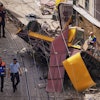NEW ORLEANS (AP) — The largest environmental disaster in U.S. history came to reckoning Thursday, as British oil giant BP announced it was paying $4.5 billion in a settlement with the federal government over the 2010 Gulf oil spill disaster and two employees were charged with manslaughter over the 11 workers killed.
The settlement was the "largest total criminal resolution in the history of the United States," Attorney General Eric Holder said.
A third BP PLC employee was charged with lying to federal investigators. Earlier Thursday, BP said it would plead guilty to criminal charges related to the deaths of 11 workers and lying to Congress.
Holder said the settlement and indictments aren't the end of federal authorities' efforts and that the criminal investigation is continuing. Holder says much of the money BP has agreed to pay will be used to restore the environment in the Gulf.
People around the world were riveted after the explosion on the Deepwater Horizon oil rig killed the 11 workers and triggered a massive spill in the Gulf of Mexico that took more than 85 days to stop.
The well on the sea floor spewed an estimated 172 million gallons of crude oil, soiling sensitive tidal estuaries and beaches, killing wildlife and shutting vast areas of the Gulf to commercial fishing.
The spill exposed lax government oversight and led to a temporary ban on deepwater drilling. The Obama administration dealt with a political headache, in part because the government grossly underestimated how much crude was spilling into the Gulf.
BP's environmentally friendly image was tarnished, and chief executive Tony Hayward stepped down after the company's repeated gaffes, including his statement at the height of the crisis: "I'd like my life back."
The federal indictment unsealed Thursday claims BP well site leaders Robert Kaluza and Donald Vidrine acted negligently in their supervision of key safety tests performed on the Deepwater Horizon rig before the explosion. The indictment says they failed to phone engineers onshore to alert them of problems in the drilling operation.
Another indictment charges David Rainey, who was BP's vice president of exploration for the Gulf of Mexico, on charges of obstruction of Congress and false statements. The indictment claims he lied to federal investigators when they asked him how he calculated a flow rate estimate for BP's blown-out well in the days after the disaster.
Before Thursday, the only person charged in the disaster was a former BP engineer arrested in April on obstruction of justice charges. He was accused of deleting text messages about the company's response to the spill.
Thursday's settlement includes nearly $1.3 billion in criminal fines — the biggest criminal penalty in U.S. history — along with payments to certain government entities.
"We believe this resolution is in the best interest of BP and its shareholders," said Carl-Henric Svanberg, BP chairman. "It removes two significant legal risks and allows us to vigorously defend the company against the remaining civil claims."
The settlement is subject to approval by a federal judge.
London-based BP said in a statement that the settlement would not cover any civil penalties the U.S. government might seek under the Clean Water Act and other laws. Nor does it cover billions of dollars in claims brought by states, businesses and individuals, including fishermen, restaurants and property owners.
A federal judge in New Orleans is weighing a separate, proposed $7.8 billion settlement between BP and more than 100,000 businesses and individuals who say they were harmed by the spill.
Holder said a civil lawsuit will go ahead in February seeking billions more in civil penalties.
BP will plead guilty to 11 felony counts of misconduct or neglect of a ship's officers, one felony count of obstruction of Congress and one misdemeanor count each under the Migratory Bird Treaty Act and the Clean Water Act. The workers' deaths were prosecuted under a provision of the Seaman's Manslaughter Act. The obstruction charge is for lying to Congress about how much oil was spilling.
The penalty will be paid over five years. BP made a profit of $5.5 billion in the most recent quarter.
The environmental group Greenpeace blasted the settlement, saying, "This fine amounts to a rounding error for a corporation the size of BP."
Nick McGregor, oil analyst at Redmayne-Bentley Stockbrokers, said, "This scale of bill is unpleasant, but I think it will be seen over time as being positive. The worst-case scenario for BP would be an Exxon Valdez-style decade of litigation. I think that is the outcome they are trying to avoid."
The government and plaintiffs' attorneys also sued Transocean Ltd., the Deepwater Horizon rig's owner, and cement contractor Halliburton, but a string of pretrial rulings by a federal judge undermined BP's legal strategy to pin blame on them.
The companies also sued each other, although some of those cases were settled last year. BP has sued Transocean for at least $40 billion in damages.
The grandmother of one man killed in the blast said Thursday that somebody needs to be held accountable, even if it doesn't end her family's pain.
"It just bothers me so bad when I see the commercials on TV and they brag about how the Gulf is back, but they never say anything about the 11 lives that were lost," said Nelda Winslette, whose grandson Adam Weise was killed. "They want us to forget about it, but they don't know what they've done to the families that lost someone."




















